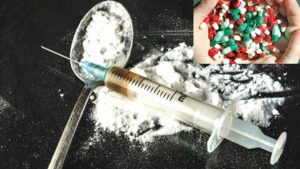DANGERS OF SUBSTANCE ABUSE

Substance abuse is defined as the harmful or hazardous use of psychoactive substances, including alcohol and illicit drugs.
Commonly abused substances include stimulants, cocaine, opioids, heroin, sedatives, alcohol, prescription pain killers such as tramadol and many more. The use of these psychoactive substances can lead to dependence syndrome- a cluster of behavioral, cognitive, and physiological phenomena that develop after repeated substance use and that typically include a strong desire to take the drug, difficulties in controlling its use, persisting in its use despite harmful consequences, a higher priority given to drug use than to other activities and obligations, increased tolerance, and sometimes a physical withdrawal state.
The dangers of substance abuse are quite numerous and varies depending on what is abused and the length of use. However, the biopsychosocial health of an individual is affected at large.
Biological effect such as: increased heart rate, hypertension, end organ damage, blood dyscrasias, malignancies, seizures, blood-borne diseases like hepatitis or HIV, impotence or infertility, learning and memory problems, lung damage, respiratory depression and coma.
Psychological effects include: tolerance, dependence and drug addiction, withdrawal symptoms when trying to cut back or quit, mental disorders, among others.
Social effect include; jeopardizing relationships with friends and family, neglecting work and school responsibilities, involvement in criminal activity and a greater risk of being victimized by crime.
Drug addicts did not start abusing substances in one day, they did gradually. Hence, it is important to totally abstain from substance abuse to maintain a healthy biopsychosocial life.

